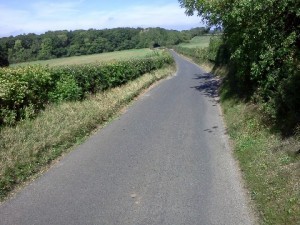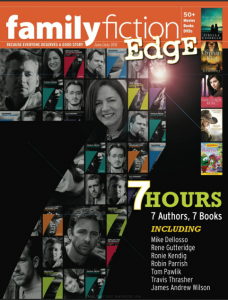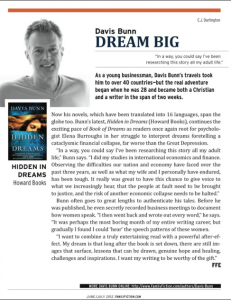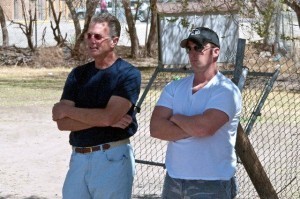Davis Bunn's Blog, page 29
June 25, 2012
‘Hidden in Dreams’ Video Trailer

Anticipation is building for the July 3 release of Hidden in Dreams, a contemporary suspense in which people from all over the world who have no connection with one another keep having the exact same dreams.
Several world-renowned clinical psychologists attempt to determine the dreams’ source, how the dreams should be interpreted, and whether the world should be warned about the dreams. The story brings together several key people who are in the business of healing — through medication, through psychology, and through faith.
Join me and my protagonist, Dr. Elena Burroughs (who returns from Book of Dreams) as we explore what’s hidden behind the veil of measurable reality.
Let me know what you think of the book trailer:






June 22, 2012
Audio Interview about ‘Rare Earth’ on ‘Christian Fiction’ With Gary Howell

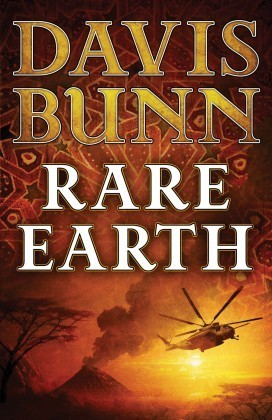 I had a wonderful opportunity to chat with Gary Howell, podcaster at Christian Fiction.
I had a wonderful opportunity to chat with Gary Howell, podcaster at Christian Fiction.
We discussed my upcoming novel, Rare Earth (releasing July 1, 2012 from Bethany House Publishers), Africa, and current events.
Here is a link to the interview:

http://garyeugenehowell.com/podcast/davis_bunn_interview.mp3






June 20, 2012
An Incredible Ride

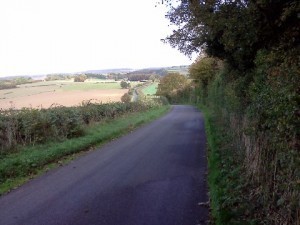 I went for another ride yesterday. Just another bike ride. I never did ride much before we moved out here to what in England is called the West Country. We left the city of Oxford for this region because of the grime and the crime.
I went for another ride yesterday. Just another bike ride. I never did ride much before we moved out here to what in England is called the West Country. We left the city of Oxford for this region because of the grime and the crime.
My brother was the one who suggested I start biking. Lee is and Iron Man competitor, and he had heard about how beautiful the cross-country cycling was out here, away from the cities. I basically entered into this kicking and screaming. I did it because there is not a gym within thirty miles.
Never in my wildest dreams did I think I would fall in love with a new sport, at the wild old age of 53. Golf maybe. But I’ve been told all my life that golf is not a sport; it is an addiction. Well, the same can certainly be said for cycling. At least as far as I am concerned.
It is a loop I discovered in parts, as in, I did one segment, and then another, and then found a connecting road, and as my strength and wind increased it became possible to link the parts together. Doing a loop means I never cover the same area twice, and also pushes me to the limits of my endurance—after the halfway mark there is only one way back, and that is to complete the course.
This particular loop covers about 45 miles. There are nine climbs each over a mile long. It contains some of the most beautiful country I have ever seen. Oh, there are certainly more dramatic places than the Wiltshire Downs. But this calm and silent land holds a charm that is uniquely British. There are moments when I stop and listen to the wind, and feel as though I have discovered the heart of England.
The weather of late has been awful. When English weather goes off, there really is nothing like it anywhere. In early June, the weather compares with the worst week of February in my home state of North Carolina.
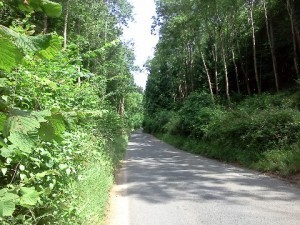 The high two days ago was 58 degrees F. It has rained for six days straight, a bitterly cold drenching rain that is driven by a wind so strong it strikes the skin like liquid nails. It did not warm up yesterday, but it also did not rain. And we have to leave for America soon. I am teaching over there for all of July and August and September, and I can’t do this particular loop in October; it’s too exposed. So I went.
The high two days ago was 58 degrees F. It has rained for six days straight, a bitterly cold drenching rain that is driven by a wind so strong it strikes the skin like liquid nails. It did not warm up yesterday, but it also did not rain. And we have to leave for America soon. I am teaching over there for all of July and August and September, and I can’t do this particular loop in October; it’s too exposed. So I went.
I left my car in Compton Basset, a village about 40 miles from my home. The first part of my ride is pretty tough. It is the one section of highway that I include in any of my favorite loops. I really don’t like cycling on highways. The traffic roars past at 70 miles an hour, on a two-lane road, but it is the only road that connects the dots.
So I stick tightly to the side of the road, and I push hard. This highway section is five miles long, and all but the first mile is uphill. There is nothing nice I can say about this section, except that there wasn’t much traffic, and when it is over, the change is as jarring as it is welcoming.
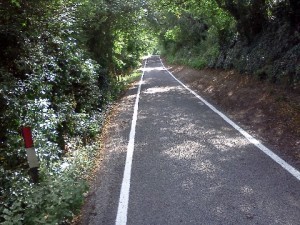 I turned off the highway onto a narrow country road, two-way traffic, eleven feet wide. This is known among cyclists as a white road. A white road indicates the color that it is shown on the national touring maps. The British government does a series of regional maps called touring guides that are astonishingly precise, and show all the tiny roads and give their gradients.
I turned off the highway onto a narrow country road, two-way traffic, eleven feet wide. This is known among cyclists as a white road. A white road indicates the color that it is shown on the national touring maps. The British government does a series of regional maps called touring guides that are astonishingly precise, and show all the tiny roads and give their gradients.
I never thought I would find pleasure in poring over a stupid map, looking for ways to connect different places while accomplishing two goals—staying off big roads, and avoiding gradients over fifteen percent. A fifteen percent grade may not sound like much. But when you have cycled one over a mile long, you know it. You know it for days.
Three miles along this country lane, I enter into Avebury. This town is ringed by planted stones, much older than Stonehenge, and without their dramatic circular precision. No one knows why these stones were planted, or when. Around five thousand years ago, is the best guess.
They stand in haphazard beauty, grey monoliths that rise from the meadows that are shared by sheep and tourists now. There must be a hundred of these stones, possibly more.
The place attracts hordes of New Age tourists. Yesterday a group had set up a wall of Tibetan cymbals and were chanting in a circle around a cluster of about six stones. This sort of thing happens all the time. It is such an utterly bizarre view, coming down this lane into a medieval village, surrounded by pastures and prehistoric stones and people with flowers in their hair.
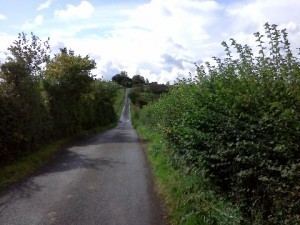 From Avebury I head up, and up, and up, in a series of dramatic swooping climbs that take me through a hidden valley. A hidden valley is my term for a dale without people. No town or hamlet or house. Just me and this tiny narrow road and fields and forests.
From Avebury I head up, and up, and up, in a series of dramatic swooping climbs that take me through a hidden valley. A hidden valley is my term for a dale without people. No town or hamlet or house. Just me and this tiny narrow road and fields and forests.
In a land as densely populated as England, it is amazing how many hidden valleys are waiting to be discovered. My route takes me up and into this valley, then up the other side and out onto a long plateau that gradually climbs into the Downs.
The Downs are an ancient name, from a time beyond time, describing a series of high flat ridges, which fall dramatically into valleys, up and down, eventually cascading down to the sea some eighty miles further south. Riding the downs is a unique experience, as there are few roads and fewer people, and most of the visitors are here for the same reason as I, to be awestruck by the region’s natural beauty.
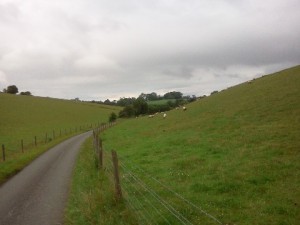 This climb is long and gradual, leading me up about five miles to the highest point in the region. The descent is almost perpendicular, and the road follows the one course that is not a vertical drop.
This climb is long and gradual, leading me up about five miles to the highest point in the region. The descent is almost perpendicular, and the road follows the one course that is not a vertical drop.
I stop at the top and look over the rusty guardrail, down some fifteen hundred feet, to the green east-west valley I will soon traverse. Far in the southern distance rise the next hills, lost in the mist and the perfume of meadows and the distant sea. The only sounds are the wind and the bleating of sheep. The occasional car passes with an apologetic slowness, like people entering a chapel or some sacred grove.
The valley is eighteen miles long, and has one road down its heart. Once I descend and take the right-hand turn onto the valley road, I am greeted by a white horse. A white horse is another prehistoric phenomenon, like the planted stones. Some are newer copies, but this one is ancient. Five thousand, six thousand years, no one knows for certain.
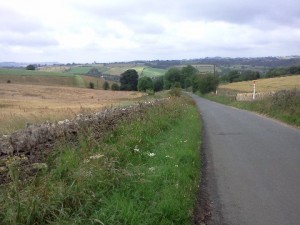 The white horse is carved into the steep hillside I just descended, and measures some four hundred feet long. It shows the image of a racing stallion, and is fashioned from the chalk imbedded in the cliff. It races alongside me for the next ten miles, until a turn in the road and the surrounding valley walls takes it from view.
The white horse is carved into the steep hillside I just descended, and measures some four hundred feet long. It shows the image of a racing stallion, and is fashioned from the chalk imbedded in the cliff. It races alongside me for the next ten miles, until a turn in the road and the surrounding valley walls takes it from view.
The climb back up is another three miles, a much steeper ascent, and then there is the final drop, the final country road, and the green forest that surrounds Compton Basset.
I have made a habit of stopping when I return to the car and giving thanks. It is not always easy, especially on a day like today, when the wind has been a force to contend with, as strong as the ascents, and blew straight into my face the entire final climb.
The sky has remained leaden and grey, and I arrive back tired in my bones. What I want most at that moment is to get home, stretch, bathe, and have a bowl of hot soup.
It is so easy to run on to the next thing. There is, after all, always another ‘next thing’. Stopping is not natural for me. I am a forward-moving guy by nature. But this day I hold to the habit, and I stop and I give thanks.
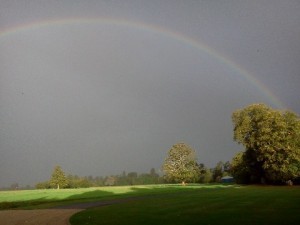 First, for the day. That I have had four free hours, and the energy and the health to come to this place, and do this ride.
First, for the day. That I have had four free hours, and the energy and the health to come to this place, and do this ride.
Second, for the chance to be here at all. Deep in the English countryside, a universe removed from haste and pressure and meetings and goals.
And third, for the Maker of this place and this moment and me. The One who feels very close, both then and again now as I write this. Because I have forced myself to do what is not natural for me.
Stop.
And say thank you, for the gift of this incredible day.






June 19, 2012
Blessed by Your Encouragement

Dear All,
The words of encouragement that have been sent in response to my recent blog post (“Moments of Vulnerability and a Glimpse of Grace”) have meant the world to me. Thank you so much for the prayers, the support, and the connection. Life is good, the healing continues. I have started back to work on the novel based upon the Unlimited film, which I still aim to complete by the end of June. Again, thank you so much for writing.
Warm personal regards,
Davis
Bev writes:
Hello, dear brother! Your post touched my heart…just wanted to tell you. Love that you’re sensitive to God’s presence. A true gift, for sure. Best regards to Isabella, as well. Blessings for a swift recovery–can’t wait to hear more about the movie.
Antoinette writes:
Davis, I am touched by your blog regarding your surgery and, in particular, your moment in the parking garage. Thank you for sharing your intimate story with us. Such moments bring us closer to God as we become aware of His presence during our most vulnerable times. The assurance that He is there, that He cares, and that whatever the future brings we are content to stay here or go to Him, as He wills. That sort of vulnerability is frightening and yet comforting. You are in my prayers for a speedy and complete recovery.
Rachel Ann writes:
Your honesty is refreshing! Thank you for being willing to share what our Heavenly Father brought into your life, and for resting in His divine sovereignty. I was blessed by what you wrote. A few years ago I went through some deep emotional waters myself, and I remember feelings very alone and vulnerable. But now, as I look back, I was never alone. Thank you for being open about your experience. May your healing be swift!
Pat writes:
I love how our Lord God can take an experience like this and turn it into a crystalizing moment of His grace and His love for us. Thank you for sharing. May our God continue to bless you and guide you.
Betsy writes:
I am in awe of this account of your entire experience concerning this surgery. Having recently been through a though time myself due to Achilles tendon surgery and recovery, I have a bit of empathy here. I will pray for your recovery daily, Davis. I will have to say that it takes an account like this (the surgery part) to remember that there is always someone out there going through something worse that what I am going through. The moment that you experienced in the garage was totally incredible. Thank you so much for sharing it and for being the person that you are. I know that you will keep us posted as you recover. Blessings and Godspeed!!
Patsy writes:
Davis, I wish you a speedy recovery. A lot of prayers going up for you, Isabella’s chicken soup and tender loving care and you will be up and writing again in no time. Thank you for sharing your experience in the parking garage. It is very obvious by this experience and in your writing that you are a man in close fellowship with our Lord. He has given you a very special gift. Always stay true to Him.
Mary writes:
Thank you, Davis. I’m sorry you’re experiencing such post-surgical challenges, and very grateful God, in His loving way, is providing intense grace moments to comfort and encourage you through this recovery time. Your sharing them with us is a gift. Praying for a thorough recovery, and the constant comfort of remembering His presence and grace.
Bill writes:
Brother Bunn – you should be eating Ice Cream to soothe your throat pain! Our Heavenly Father knows your pain and suffering, and He will comfort you. You have done so much good in His name. As you recline, be confident that it is in the palm of His hand. Remember, it is for what we sacrifice here on Earth, that we are rewarded for in Heaven. You have made many sacrifices. Your stories touch so many hearts. Thank you, Your Brother Bill
Larry writes:
Davis: Thank you for sharing that moment of time in the life of Davis Bunn. As I read your writing it was like I was sharing your hospital experience, even in the basement ~ like a stillness and a thinning veil… My prayers are with you and my wife said if you went to Starbucks, you’ll be OK! HA! And greetings from Oklahoma…
Dave writes:
Well, Davis, you have had a rather humbling experience. As a 9/11 survivor, resuscitated twice, I too had “a glimpse of the hereafter” at 62. Today, those experiences and lessons are real, causing me to be thankful for every breath and iota of love from family and friends. That tent, “made without hands” is looking better every day. May He continue to inspire you in your writing.






June 13, 2012
The Rough Cut

This past weekend, my wife and I received a minor miracle. By ‘minor’, I mean that no great world-changing event took place. No higher order of peace was achieved in the Middle East. As far as miracles go, it was more in the common garden-variety category. But still…
As far as we are concerned, there is no question. We witnessed a miracle.
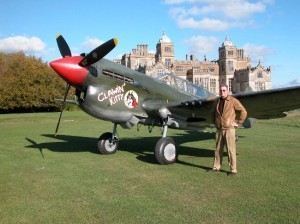
That's my "house," in the background
In order to understand just how amazing this event was, I need to explain something about our home here in England. The big house where we have our apartment is located at the end of a two mile-long lane. The telephone and power cables were all laid down in the ‘60s. Which means the phone lines are old, the seals are corroding, and we cannot get high-speed internet.
Up until last year, all we could get was dial-up.
It’s a beautiful world, our little haven in the fields. But it is also a world without Skype, or downloadable films, or music, or video conferencing. It’s not quite as bad a connection as where we lived back when we first arrived in England. That was an Edwardian boathouse, converted to a home back in the nineteen-teens. We renovated one room, and discovered all the wiring wrapped in old newspapers. The Times, to be exact. The headline was about the negotiations to end the War to End All Wars.
All this has something to do with the miracle. Really.
This past week, I invited my wife on a date. We have both been so busy since we returned to England—the surgery, and Oxford term, and work on the Unlimited novel. But a week ago I completed the novel’s first draft, and last Thursday I gave my last class and completed all the tutorials for this term. So I invited Isabella to go away for a little weekend break. I took her back to the village where we used to live, and still love, called Henley-On-Thames.
As the name suggests, Henley sits on the River Thames. Its history is pretty amazing. Back in the early medieval era, when the river was the major conduit for transporting goods through the heart of England, Henley was the seat of the royal customs houses. All goods transported along the King’s river was subject to the King’s taxes.
There are still houses in Henley that are over a thousand years old, that bear names from this time—the Salt House, and the Corn Exchange, and the Wool Market, and so forth. At that point, Henley was home to almost five hundred taverns and inns—not bad for a village of some five thousand souls. There is still one brewery, Brakespear, that has been making ale in Henley for more than seven centuries.
We left Henley because it was ‘discovered’ by rich London bankers, who, in one twelve-month period, pushed up the housing prices so high we could no longer afford to stay. In one year our rent went up 350 percent. At the time, it was a very hard moment. I can’t say I’m glad it happened. But I am very happy that we’ve had a chance to live where we are now. Very glad indeed.
So we returned to Henley, and stayed in a riverside manor called the Phyllis Court Club. It basically looks like a wedding cake that sits on an emerald lawn right alongside the river. It is one of my wife’s favorite places in the whole world. So to celebrate all the milestones, and to thank her for nursing me through the recovery from my operation, I took her to Henley for a date.
 After my last tutorial, we drove down from Oxford. Before dinner, I checked my emails, and to my astonishment I discovered a note from the producer of the Unlimited film, Chad Gunderson, announcing that the rough cut was completed.
After my last tutorial, we drove down from Oxford. Before dinner, I checked my emails, and to my astonishment I discovered a note from the producer of the Unlimited film, Chad Gunderson, announcing that the rough cut was completed.
The rough cut of a film means that from all the hours and days of shooting film, a basic structure has been laid out from beginning to end. The soundtrack is in place, including the initial structure of the music. There is still a great deal of polishing to be done. But this is the first glimpse any of us have had of the story in its entirety.
The basic rule of thumb in watching a rough cut is, this is the worst this film will ever look.
Which means the only people who should see even a glimpse at this stage are pros – people who know to look beyond the off-tempo moments and the scratchy sound and the absence of special effects – and so on and so on and so on. There are a thousand different reasons why the rough cut could be a toe-curling experience. The best thing that can be said for most rough cuts is, there might be a film there somewhere. Basically the experience is a jagged shift from one cringe to the next.
My wife has never seen a rough cut before. When I told her over dinner that the link had come to the rough cut, she immediately demanded to see it.
“Let’s not ruin a lovely meal,” I begged. “It can wait.”
“Wait? Wait for what? For the sky to open and the Second Coming to arrive?”
“Let’s go home. I’ll go over to a friend’s house. I’ll give it a first look…”
“You’re not seeing this without me.”
“You don’t know what you’re saying.”
“We’re not waiting. They have wi-fi in this hotel. We’re watching it. Tonight.”
There are moments in married life when all the logic in the world is defeated by a woman on a mission.
My dearest friend in the publishing world, Gary Johnson, former President of Bethany House Publishers, was having a discussion like this one with his granddaughter last week. The granddaughter is nine years old.
When she came up with an idea that he had a hundred reasons to nix, she planted her hands on her hips and said, “Stay with me here, Grandpa. You have two choices. You can argue with me and then do it, or we can go have some fun.”
Which was exactly what I thought about as I gave my wife the inevitable answer, which was, “Okay.”
So I went to the front desk, and explained what had happened, and asked if we could sit in the disused room closest to their wi-fi connection. To stream a professional cut of a film, we needed every ounce of oomph their e-link could provide.
The receptionist responded without the blink of an eye. I mean, it was like she had been sitting there all day, just waiting for me to come up and say, I’m a novelist and a screenwriter, and there’s this film that I’ve been working on for over a year, and we have a chance to see it…
The receptionist announced that they had just redone their conference room, and installed a professional-grade overhead projector and a wall-sized screen.
So we took our desserts and our coffees and moved into this room with padded swivel chairs. And this really nice guy came in and hooked up my laptop to their system.
And there comes the film. Just remembering that moment gives me chills. Readers who have followed the course of this project will understand when I say, there have been moments when all we had to go on was prayer. And yet here we were, holding hands in the darkened room, watching rain streak our window and make patterns upon the river, and then the dream came to life.
Unlimited is without question the finest inspirational film I have ever seen.
There are so many astonishing aspects of the finished project. I am going to mention just two here, and come back to others later on.
A few weeks before we started filming, the insurance groups that cover risk on a film production stopped covering work in Mexico. The violence and the risk of kidnapping were just too great. Which meant it was possible to film in the slums of Rio, or Angola, but not across the border from El Paso. So one of the last-minute issues our producer and director had to overcome was finding sites that looked like Mexico, but were north of the border.
There are moments in the film when the border fence becomes visible. And I know at some level that I am looking south, from Texas into Mexico. But my logic doesn’t hold me. Because at a gut level, I am so caught up in the atmosphere that I’m in Mexico, seeing across the impossible divide, and there on the fence’s other side is the forbidden land, the richness and the opportunities of USA. Which it isn’t. It’s actually the other way around.
That’s one thing. The other is the cadence, or what in film parlance is known as the beat structure.
Too often inspirational films go like this: Story, story, story, then soapbox, soapbox, then back to story again.
The hardest thing about bringing an inspirational story to the big screen is finding that balance between message and story, so that the entertainment value is never lost, not for an instant. Because this must happen, it must become the norm, in order for inspirational films to start drawing a mainstream audience.
The message of Unlimited is solid. But at no point – not one – is there the sense that the moral pulls the viewer out of the story. It is amazing.
The emotional ‘feel’ is constant.
The tension and the flow and the steady unfolding of the plot draws beautifully towards the climax.
The lighting is exquisite. It holds to that arid Mexican yellow, the parched quality so powerful I was comparing it in my mind to favorite big-budget movies that have been shot in desert settings.
Unlimited is a good movie. Really. As a rough cut, it is fun to watch. From start to finish.
I will finish here with a request.
This week the producers and director are flying to Nashville to show this rough cut to major backers. It is a vital step. Crucial. So much hangs on this showing. Your prayers would be so very much appreciated.
We stand in prayerful thanks, our hands outstretched to receive the next miracle.






June 12, 2012
Book Review: ‘Lion of Babylon’

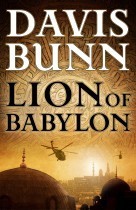 By Sidney W. Frost
By Sidney W. Frost
Guest Reviewer
This story is about what happens after Marc Royce, a former State Department agent involved in covert operations, is called back into service in Baghdad to find his best friend Alex Baird, a CIA agent, who has disappeared.
In addition to his friend, there are two women missing, Claire Reeves, a nurse, and Hannah Brimsley, a volunteer at a church in the Green Zone. Farouk El-waziri, the son of a prominent Iraqi family who knew the three Americans is also missing. Marc had been forced out of his job as a State Department operative because he had insisted on being with his wife when she was terminally ill.
The story begins three years after her death and Marc is working in Baltimore as a forensic accountant when his former boss, Ambassador Walton comes to urge him back into service. This is also the story of Sameh el-Jacobi, an Iraqi lawyer who is a member of the Syrian Christian Church in Baghdad.
Although the book is fiction, I had a feeling that the author had been to post-Saddam Iraq or had done a great deal or research about the setting. What he says about the people and the place rings true. I liked the inside look at what it is like to live and work in Baghdad after the fall of Hussein.
I also learned more about Iraq and its history. I was surprised to learn about the Christians in Iraq.
This was the first book by Davis Bunn that I’ve read, but I now understand why he won three Christy awards and is a bestselling author of more than six million copies.
A note from Davis:
Lion of Babylon is Book 1 in the Marc Royce stories. Book 2, Rare Earth, releases July 1, 2012, from Bethany House Publishers.
Here’s the video trailer for Rare Earth — let me know what you think of it.






June 11, 2012
FamilyFiction EDGE Magazine Interviews Me About ‘Hidden In Dreams’

I’m honored that FamilyFiction EDGE is featuring an interview with me in their June/July 2012 issue. C.J. Darlington asked me about my upcoming novel, Hidden In Dreams (available July 3). You’ll find C.J.’s article on page 8 of the free online magazine.
Click on either of the images to go straight to the magazine.






June 7, 2012
‘Lion of Babylon’ Book Club Questions

Debbie writes:
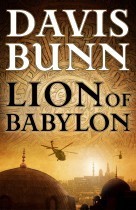
We are having a book club discussion on Lion of Babylon. What would be some key questions to talk about?
Dear Debbie,
Thanks so much for your note. Below you will find my own personal favorites from the reader’s discussions. I hope you and your group have a splendid time.
Warm personal regards,
Davis
Discussion Group Questions for Lion of Babylon
1. Marc had previously lost his job because he chose to devote himself to caring for his wife during her last months. Have you personally faced a similar decision, where you had to choose between family and work? Did you feel good about your decision?
2. Marc’s grief and love for his late wife seem to have helped him to go forward into these dangerous situations, not foolishly but with a sense of purpose and courage born of faith and love. Have you experienced great loss in your life that you were later able to draw from in order to find your purpose and courage in life?
3. The women in Sameh’s family are so vividly portrayed in the story. As you were reading the story, what surprised you about the women’s lives?
4. If Sameh and his family were to use their green cards and move to the United States, how do you imagine that their lives would be changed?
5. Do you believe that Leyla and her daughter will immigrate even if Sameh and his wife remain in Iraq? Why or why not?
6. How significant was the Grand Imam’s announcement?
7. What are Marc’s characteristics, beliefs, and behaviors that enable him to become such an important “ambassador” among the people of Iraq?
8. Marc obviously loved his wife very much. How did her illness and subsequent death change his life? How does his being a bereaved husband inform his actions throughout the story?
9. What is the significance of the Lion of Babylon in this story?






June 5, 2012
The Writing Life: Weightlessness

 Some projects end with a greater sense of accomplishment than others. Yesterday I finished the first draft of the Unlimited novel. I will set it aside for about two weeks, and give myself a chance to emerge from the emotions wrapped up in the creative process. Then I will go back, structure the chapters, do the initial polish, and share it with the team.
Some projects end with a greater sense of accomplishment than others. Yesterday I finished the first draft of the Unlimited novel. I will set it aside for about two weeks, and give myself a chance to emerge from the emotions wrapped up in the creative process. Then I will go back, structure the chapters, do the initial polish, and share it with the team.
It is an odd feeling right now. Normally there is a huge sense of emotional catharsis, as close as I will probably ever come to a mother’s experience of giving birth. I have carried this novel longer than most, sixteen months since I first started working on the screenplay.
But all I feel is a sense of temporarily setting down the weight. So many people are involved in this now, and the numbers are still growing. There will be a lot of readers from the film side, as well as editors and marketing people within the publishing house. A lot of discussions to come. So the release is not as complete as usual. But it is very sweet just the same.
When we decided on Mexico as the setting for the story, I had two huge qualms. The first was my utter lack of experience in the country or the language. I have started from ground zero before, but to do so with Mexico was different.
The publishers immediately started talking about how great it would be to do a Spanish version in house, and market the project in both languages from day one. This meant my book would come under immense scrutiny from people within this culture, in their language. This too would be a first.
I speak four languages. Spanish is not one of them. I have been to Mexico on numerous occasions, but never to study the culture, just to surf. I know the waves and the ocean communities, and that is it. I have spent a good deal of time in Spain, but in the one region where Spanish is not generally spoken—the Basque coast. Which makes me about as poorly prepared to write such a story as I’ve ever been.
The prayerful feeling in setting out was one of such intense calm; it makes me laugh to think back to those early days. I was, to say the least, frantic. The time pressure on the script side was just enormous. The shift to Mexico was decided on last October, and we were scheduled to begin shooting in March.
Then the miracles began.
My brother was brought to faith while a student at UVa. His mentor was a pastor with Youth With A Mission, whose family has run a farm in Mexico for four generations. When his father retired, he went back and took over this farm. It is quite a place, two thousand acres of mostly garden vegetables intended for the American market.
Three weeks before I started on this project, his wife went into their closest city for their weekly shopping, and gang members tried to kidnap her and their youngest child. So they relocated back to Texas, and he has been frantically looking for things to fill his time while he searches for a new job.
He is known far and wide as Bobo. Bobo became my lifeline. I told him what I wanted to do in terms of the action, and Bobo told me what it would look like, both through the eyes of an American in Mexico, and then as a Mexican seeing the same thing.
The writing of a novel requires a far greater depth of study than a script. Descriptions and internal structure form the richness that transforms the story into a well-crafted novel. A screenplay is basically a blueprint. Just like in the construction of a new home, the blueprint is not the home, and yet it is.
With a novel, either it is on the page or it is not. No one else will add to the creative structure. The basic story was there after completing the screenplay. But I still had to go back and create the finished novel.
I have already spoken about the thrill of working on set, spending those amazing hours listening to the actors tell me about how they saw the characters. It was such an intense series of days, I learned so much.
This sense of being instructed went far beyond the story. I was being taught to see through the eyes of citizens of a border town in Chihuahua state. They were intent upon revealing the fears and struggles and intensity of modern life there.
They are fiercely, deeply patriotic. They love their desert world with a passion that humbled me. And they are so frightened. So worried about the current struggle. Their world is beautiful and dreadful. And they shared both faces with me.
Towards the end of my time in El Paso, this connection extended beyond the film crew to an orphanage run in Juarez by Youth With A Mission, the same group that brought my brother to faith. What makes this circular miracle even more awesome is, my brother was instrumental in my own spiritual turning. My last day there, I interviewed a young woman, Brenda, who graduated from the orphanage and is now studying at a university in the US. Brenda had read the first part of my script, and for a few hours she ‘became’ the principal female character, Sofia, who had left an orphanage to study in the US, just like her.
There was one moment in particular that just blew me away. I had a problem with the character’s internal motivation. In the initial sequence of scenes, Sofia has to both like Simon, and be repelled by him. How could this happen?
In the film, it was not an issue; the entire sequence only last about ninety seconds. Film time is so hyper-swift, such issues can often be overlooked and the audience is left to fill in the gaps.
But in the novel, this would be a focal point for the first three or four times Sofia’s point of view is revealed. I had to get this right, and I didn’t know what to do. So I asked this young woman, and she responded not as Brenda, not as herself, but as Sofia.
It was the most amazing moment, because for the first time, I saw the story come alive. It was no longer a tale being written by a foreigner. It had been adapted and nurtured by the hearts of all these people, who had entrusted me with their vision and their emotions and their spiritual walks.
This moment of completion cannot be whole without saying how immensely grateful I am for this gift of trust. I hope and pray this book honors them and their world.






May 31, 2012
Unlimited Feedback

There have been some truly beautiful comments regarding the UNLIMITED film blog posts. Here are a couple that meant so very much to read:
Fascinating reading on your UNLIMITED experiences and more. I just read a quote by C. S. Lewis that indicated he “never made a book; it was more like taking dictation.” They were given to him. That sounds like what happened in your eight days. Of course, creativity favors a prepared mind.
I also enjoyed your attitude and humility on the UNLIMITED set. Your questions were remarkably like characterization questions that actors use to study their roles. Right on target!
I share the dreams of seeing my Christian/family musicals produced in a larger venue and hope that I could relinquish creative attachment so as not to be an annoyance. You have been a great role-model and I’d better read what you said again! Hopefully, you are leading the way for investors to tap into the extremely large Christian audience that craves authenticity and a professional product. Did not The Passion of the Christ box office send a message?
My other comfort is your title changes…I know mine are not yet right…but the content seemed to flow right from above. Therefore, I have hope that in God’s timing, they will be used. Thanks for your insights and the fellowship of your experiences.
Skyler writes:
I learn, too! Every time I read your work, your blog, your posts it is like completing a continuing ed course in this journey called life. I’m enriched and enabled to keep on seeking, growing, learning in my own life. All glory to God!
Thank you so much for the beautiful words. In this time of being pulled in a number of directions, such warm and caring comments have helped so much to keep me clearly focused upon what is most important, what is vital, what is eternal.
Warm personal regards,
Davis







